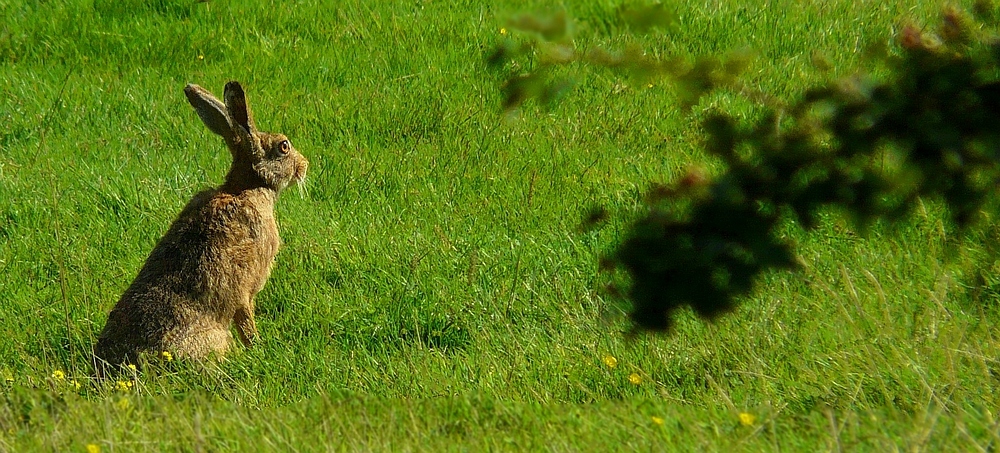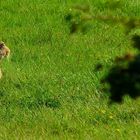European Hare
The European Hare is a mammal that primarily lives in open fields and pastures near agricultural areas and can reach a speed of 72 km/h.
Its elongated ears are rotatable 180° and provide an excellent sharp hearing while the laterally placed eyes provide a field of view of 360°.
Since the sixties and seventies of last century, the once abundant hare underwent a significant decline.
Overhunting, even in its breeding season (!), has contributed to this decline.
This species has minimal legal protection in most European countries and as a result appears gradually on the Red List as "near threatened" or "threatened".
Dutch name : Haas
German name : Feldhase
Latin name : Lepus europaeus










Cobrak 21/12/2013 0:58
:-)!Gunther Hasler 10/10/2012 14:04
Hallo Mark, danke für die Bestätigung! Dein Hinweis auf den schwachen Schutz des Feldhasen ist sehr berechtigt. In D steht er zwar unter Schutz, darf aber weiterhin bejagt werden...Gruß, Gunther
† Ushie Farkas 24/09/2012 6:20
STARKES HASEN Portrait! Gruß UshieClaudio Oldrini 23/09/2012 17:15
Fine capture,bravo!claudio
TeresaM 23/09/2012 4:00
Une vision superbement composée ! Beau portrait de ce lièvre, Mark !Bon dimanche :-)
carinart 22/09/2012 14:52
Man könnte seine Haare zählen, so herrlich scharf ist dein Portrait!L.G. Karin
Inge Stüwe 22/09/2012 6:45
Da warst Du im richtigen Moment zur Stelle,schön, wie er so sitzt und lauscht,
ein super Foto!
Liebe Grüße
Inge
willy ombret 20/09/2012 19:41
très bonne et belle approche très beau profilwilly ombret
Vitória Castelo Santos 19/09/2012 23:41
Lovely!!!!!!!Adele D. Oliver 19/09/2012 20:00
wow - how fast they can be, and you captured him well sitting still and looking as if he is keeping a sharp eye on you .... I like the balance of hare and branch in your image too !!greetings, Adele
Angelika El. 19/09/2012 18:12
Einfach großartig hast ihn erwischt! Die Pose ist klassisch und sehr fotogen! Gefällt mir ausgesprochen gut, Deine Aufnahme!
LG!
Angelika
Alfred Schultz 19/09/2012 17:29
We all need them on Easter for colored,boiled eggs delivery.
Very well captured.
Cheers - A.
Vera M. Shulga 19/09/2012 16:40
Lovely shot!..In this spring I saw two big European Hares near my garden.:-)
Truly, there are fewer...
Vera
Mark Billiau. 19/09/2012 16:00
@ Othmar,In Europe, every year many hares are killed by hunters during their breeding season, with a dramatically decline in number as a result !
I am not telling that YOU did that too, I am just telling the truth : it happens, despite all laws and rules.
And that's a fact.
Mark
Othmar W. Mayer 19/09/2012 14:27
Hi Mark,I am glad that you try the brown hare "strike a blow".
Sorry, You authorize the hunters a red card.
I stand by my credo: "Hunting is applied nature conservation" and was opposed to any generalization.
In different European countries, the practice of hunting is regulated differently. Without exaggeration one can speak of different cultures. Here I want only to take action in Austria position.
Mention the name of Austria in the circle of international nature lovers and hunters, is so good that each one hunting diversity of this small country. Of ducks and geese on the Neusiedler See in the east up to the Capricorn in the Vorarlberg mountains in the far west - in Austria, almost all European wild is represented.
Austria - whose name means "Ostarrichi" was mentioned more than 1,000 years ago for the first time - is a country with a strong history of hunting and hunting traditions. The days when the hunt was only a privilege of the nobility are, since 1768 (Josefinisches patent) over. The hunting regulations became the imperial law. 1818 citizens and farmers were able to purchase a hunting or such a lease. In 1849, the hunting in a patent as was recognized directly connected to ground.
If you want to highlight the economic importance of the hunt itself in Austria, on the one hand, the economic values are used in the practice of hunting itself, on the other hand, the indirect influence of the hunting industries are called. Hunting lease, trophy fees (approximately EUR 58 million),
value venison, venison volume (approximately EUR 29 million), taxes, fees, insurance (approximately EUR 22 million), wages and salaries (approximately EUR 182 million), hunting operating costs, hunting weapons , optics, ammunition, ... (Approximately EUR 145 million). Total approximately EUR 436 million (Source: Central Office Austrian Landesjagdverbände.).
In the liner notes to
Im Seewinkel
Meister Lampe
Schadhase
Rammelzeit
Sich drückender Hase
I've written a lot about hunters and gamekeepers.
Interested parties may
http://www.jagd-wien.at/Feldhase.618.0.html
http://www.weidwerk.at/html/jauwi.htm
retrieve.
The Austrian Landesjagdverbände, as representative of a traditional European hunting country with a leading position in the Alps observed, not only the developments in the neighboring states very accurately, but also actively working on international projects. This is not only in the EU, in the FACE, but also in Eastern European countries. The feared by many Austrian hunters circumcision chasing the EU accession has not been made to date. Is to be hoped that the subsidiarity principle continues to retain high value and the snipe in the spring remains the hunters also receive, such as the Greater and Lesser Balzjagd on tap.
Of the many facilities that deal with scientific wildlife, hunting and ecology apart, the most important:
Research Institute of Wildlife Ecology
http://www.fiwi.at/
and
Institute of Wildlife Biology and Game Management
http://www.dib.boku.ac.at/iwj.html
Greetings from Vienna
Othmar